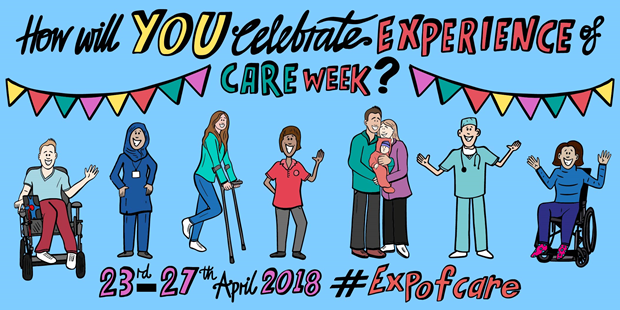
In my last post I promised you a report on the contribution of non-clinical staff to patient experience. And here it is:
The Impact of Non-Clinical Staff Members on Patient Experience
The report is authored by Sarah Parker and Daniel Mckay, medical students at Sheffield Medical School, who carried out this research during their community placement with Care Opinion in Nov/Dec 2016.
In this study, Sarah and Daniel analysed 497 stories on Care Opinion relating to six groups of staff: porters, receptionists, cleaning staff, catering staff, security and parking staff.
Overall findings
As expected, patients reported important positive experiences with all staff, which were sometimes the most significant experience of their episode of care. But they also reported important and sometimes distressing negative experiences.
Patients and carers remarked positively on the kindness, friendliness, helpfulness, competence and caring shown by non-clinical staff. They also noted when clinical and non-clinical staff worked effectively together as a team, sharing information, communicating well among themselves, and treating one another, as well as patients, with warmth and respect. Conversely, in some of the stories we read, patients noted that such teamwork was absent and how that adversely affected their own healthcare episode.
Catering and portering staff were praised for the personal, individualised service they often provided, which itself was seen as a form of care. To provide this level of service, catering and portering staff had to be aware of how each individual patient was affected by their condition.
By contrast, security and cleaning staff were not expected to provide a service which was individual to a patient. Instead, they were seen to be ensuring the safety of the unfamiliar, sometimes threatening environment in which patients found themselves. Thus, for these staff, the main concern of patients was their willingness and ability to do their jobs effectively.
Reception staff occupied a vital role for patients, since they were the conduit for information flows to or from the patient, and the route through which the patient became able to access care in the first place. An overriding concern for patients was that their information flowed back and forth in ways which were accurate, timely and confidential. This did not always happen, causing distress and sometimes risking the patient’s health.
Parking staff are perhaps the staff group most familiar to patients from their everyday experiences, and in a healthcare setting such staff occupy a place which is neither clearly within the hospital or apart from it. Patients seemed to have higher expectations of hospital parking staff than they might of similar staff in other settings. They were upset by those who displayed an uncaring attitude, or a lack of awareness of how a person’s condition might affect their ability to use the car park.
All non-clinical staff groups were able to hold a particular value for patients precisely because they were non-clinical. They often seemed to represent “people like me”, who through news, conversation and humour were able to connect the patient to their everyday life outside the hospital, and perhaps to a previous life without illness or injury. Staff who were able to do this seemed to have a profound effect on the morale of patients.
Overall, it was clear that, just like their clinical colleagues, non-clinical staff were vital in either building or corroding the relationship of trust which is essential for high quality healthcare to be possible.
Improving patient experience of non-clinical staff
Increasingly, the clinical professions are recognising the importance of patient feedback as a stimulus to quality improvement, whether at the level of the service or the practitioner. For example, the medical and nursing professions now require practitioners periodically to “revalidate” in order to continue practising. Such revalidation will almost always include patient feedback.
Yet despite the importance of non-clinical staff to patient experience, it is rare for these staff to see specific patient feedback about the service they provide, except perhaps within the context of a formal complaint. Nor is it common for such staff to be included in quality improvement programmes using such feedback.
Given how much feedback is now available, through Care Opinion or other systems, it would be a missed opportunity if this was not routinely shared with the staff it relates to, including non-clinical staff.
Increasingly, local service managers and clinicians are responding directly to the authors of posts on Care Opinion. There is no reason why appropriate non-clinical staff should not have the opportunity to do the same, owning and acting on feedback about the service they provide.
Webinar and tweetchat
On 25 April, as part of Experience of Care week 2018, Care Opinion is hosting a free webinar and a tweetchat on themes and implications of this report.
Full details are in my previous post.
Slides from the Experience of Care webinar 25 April 2018
New report: the impact of non-clinical staff on patient experience
New report: the impact of non-clinical staff on patient experience https://www.careopinion.org.uk/resources/blog-resources/1-images/489c3521b1ae41b392968ebec61d3561.png Care Opinion 0114 281 6256 https://www.careopinion.org.uk /content/uk/logos/co-header-logo-2020-default.pngUpdate from Care Opinion
Posted by James Munro, Director of Research & Development, Care Opinion, on
Response from Andrew O'Donnell, Head of Hotel Services, NHSL on 16 Apr 2018 at 15:56
As a provider of Non-clinical support staff at UHW
We have built a clear and compelling evidence base that how our staff undertake their roles and interact with patients can make a huge difference to patient experience, even impacting the speed of recovery and care outcomes.
We have recently delivered a programme to help unlock the support workforce’s potential, first, we need to empower support staff and help them understand the power they have to impact on the patients journey.
That means encouraging them to speak up and suggest ideas or raise concerns, and creating a culture in which they feel part of a single team with clinical colleagues, working towards the shared objective of delivering great care.
It was during this programme that I found out about Care Opinion and what a great tool this would be to get feedback that as a service provider we would not normally get, following some investigation and a few phone calls we managed to get approval and training through Care Opinion to participate.
This has proved to be very useful, we can respond direct to any stories or comments, and now able to share with our frontline staff good news stories or put in place improvements to ensure the best patient or visitor experience.
Looking forward to the Webinar.

